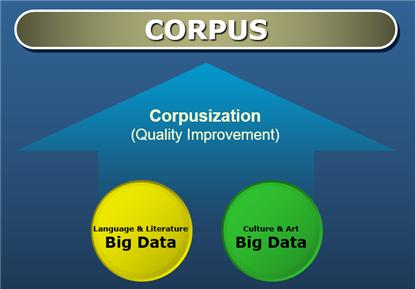세계는 과학 기술의 혁신을 바탕으로 초지능·초연결 시대에 진입하였고, 4차 산업혁명 시대로 불리는 미래사회에서는 산업구조와 생활방식의 대변혁을 맞이하게 될 것으로 예측됩니다. 우리 정부는 이러한 변혁의 시기를 국가적 방향의 대전환 계기로 삼기 위해 분야별 핵심 원천기술과 이를 활용한 융합기술 개발 등 하드웨어적인 부분뿐 아니라 지식기반사회에서 바라보는 인문사회적 소프트웨어 부분을 반영하기 위한 학제간 디지털 인문 융합 지원 사업에 박차를 가하고 있습니다.
과학 기술은 오래전부터 문학과 문화·예술 작품 속에 반영되어왔고, 문학과 문화예술은 현실과 비현실 세계를 무대로 다양한 과학 기술과 상호작용해 왔습니다. 러시아 문학가의 트랜스휴머니즘에 영향받은 러시아 과학자들이 바이오 인공장기 이식 개발 성공하여 인공장기 산업의 선두주자가 된 사례에서 볼 수 있듯이 문학과 문화예술은 다양한 분야에서 창의적 영감을 불러일으키는 시발점이 되기도 합니다.
2000년대 초반 글로벌 정보통신 기업들이 사용하기 시작한 빅데이터는 ICT 기술의 발달과 스마트 디바이스에서 발생하는 대용량 데이터를 의미합니다. 하지만 빅데이터의 목적성이 대두되는 최근에는 빅데이터의 양(quantity)보다 목적에 부합하는 질(quality)의 중요성이 강조되고 있습니다. 빅데이터를 고도화하는 단계를 거쳐 정제된 코퍼스(corpus)를 분석하기 위해서는 인문, 사회, 문화, 예술, 바이오, 공학 등 다양한 학문 분야에서의 융합적 접근이 중요합니다.(<그림 1> 참조)

코퍼스 연구는 디지털 인문 융합이라는 4차 산업혁명 시대의 핵심 과제와 밀접한 관계가 있으며, 인문, 사회, 문화, 예술, 바이오, 공학 등 다양한 학문 분야를 통섭하는 차별화된 인천대학교만의 디지털 인문 융합 발전 전략이라는 측면에서 필요가 있습니다.
The world has entered an era of super-intelligence and super-connectedness with regards to technological innovation. The transformations to society, industrial structures and lifestyles we are experiencing are being called by some the origins of the Fourth Industrial Revolution. At this pivotal point in history, the Korean government is focusing attention at the national level on expediting their supportive efforts for academic institutions’ projects within the digital humanities. Their intent is to not only support hardware aspects, such as the development of core technologies in each sector and their respective dependant convergence technologies, but also to support software in the humanities and social sciences with the goal of further development towards a knowledge-based society.
Science and technology have long been reflected in literary, cultural, and artistic works, and, in turn, literature, culture, and art have interacted with various scientific technologies in both the real and virtual domains. One fine example of this is when Russian scientists, influenced by trans-humanitarianism in Russian literature, succeeded in developing bio-artificial organs. They went on to become leaders in the artificial organ industry, as well as literature and culture while also becoming sources of creative inspiration in various other fields.
Starting in the early 2000s, global information and telecommunication companies developed ICT technology. The resultant large amounts of data generated by smart devices gave way to what is now known as big data. However, as the uses for big data have increased, escalating importance is being placed on quality over quantity. A convergent approach that incorporates a variety of disciplines, including the humanities, sciences, social sciences, fine arts, and engineering, is, therefore, important in the analysis of corpus and must be refined by increasing upgrades in the quality of big data (See Figure 1 above).
The study of corpora is closely related to the central tenants of the Fourth Industrial Revolution, which also known as the era of a convergence of digital humanities. At the University of Incheon, a unique interdisciplinary strategy in understanding this era of a convergence of the digital humanities has been developed to bridge corpus research across various disciplines.